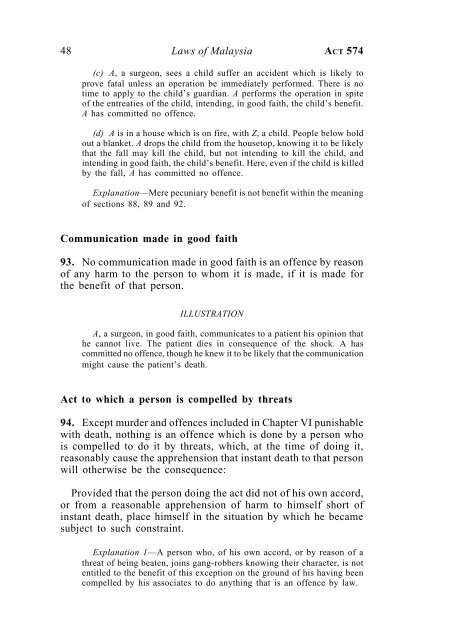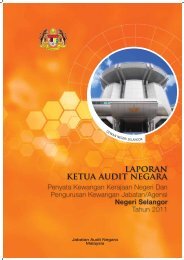Act%20574
Act%20574
Act%20574
You also want an ePaper? Increase the reach of your titles
YUMPU automatically turns print PDFs into web optimized ePapers that Google loves.
48 Laws of Malaysia ACT 574<br />
(c) A, a surgeon, sees a child suffer an accident which is likely to<br />
prove fatal unless an operation be immediately performed. There is no<br />
time to apply to the child’s guardian. A performs the operation in spite<br />
of the entreaties of the child, intending, in good faith, the child’s benefit.<br />
A has committed no offence.<br />
(d) A is in a house which is on fire, with Z, a child. People below hold<br />
out a blanket. A drops the child from the housetop, knowing it to be likely<br />
that the fall may kill the child, but not intending to kill the child, and<br />
intending in good faith, the child’s benefit. Here, even if the child is killed<br />
by the fall, A has committed no offence.<br />
Explanation—Mere pecuniary benefit is not benefit within the meaning<br />
of sections 88, 89 and 92.<br />
Communication made in good faith<br />
93. No communication made in good faith is an offence by reason<br />
of any harm to the person to whom it is made, if it is made for<br />
the benefit of that person.<br />
ILLUSTRATION<br />
A, a surgeon, in good faith, communicates to a patient his opinion that<br />
he cannot live. The patient dies in consequence of the shock. A has<br />
committed no offence, though he knew it to be likely that the communication<br />
might cause the patient’s death.<br />
Act to which a person is compelled by threats<br />
94. Except murder and offences included in Chapter VI punishable<br />
with death, nothing is an offence which is done by a person who<br />
is compelled to do it by threats, which, at the time of doing it,<br />
reasonably cause the apprehension that instant death to that person<br />
will otherwise be the consequence:<br />
Provided that the person doing the act did not of his own accord,<br />
or from a reasonable apprehension of harm to himself short of<br />
instant death, place himself in the situation by which he became<br />
subject to such constraint.<br />
Explanation 1—A person who, of his own accord, or by reason of a<br />
threat of being beaten, joins gang-robbers knowing their character, is not<br />
entitled to the benefit of this exception on the ground of his having been<br />
compelled by his associates to do anything that is an offence by law.



